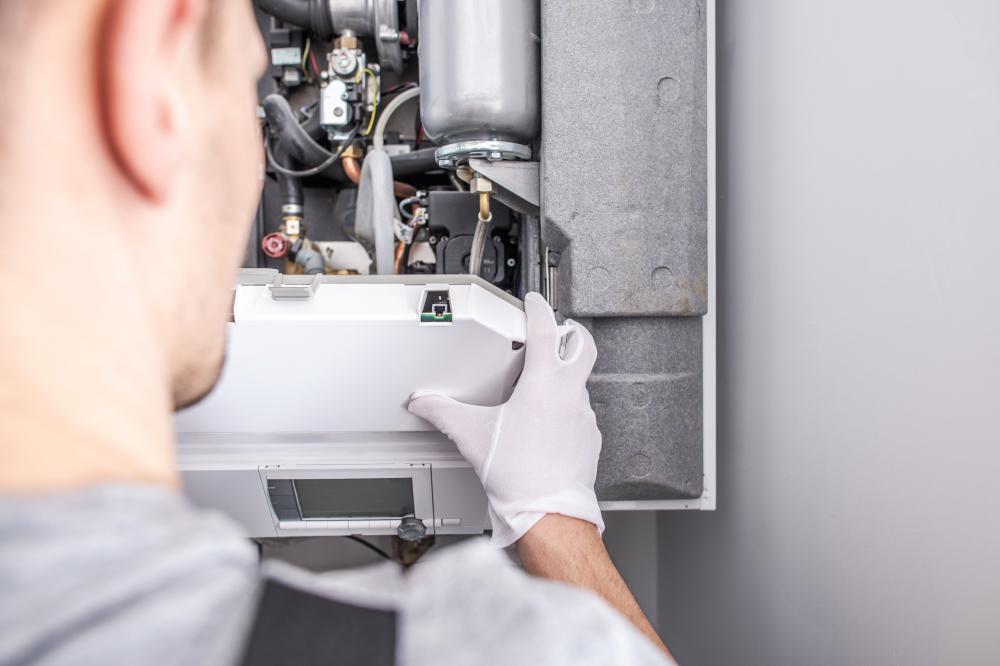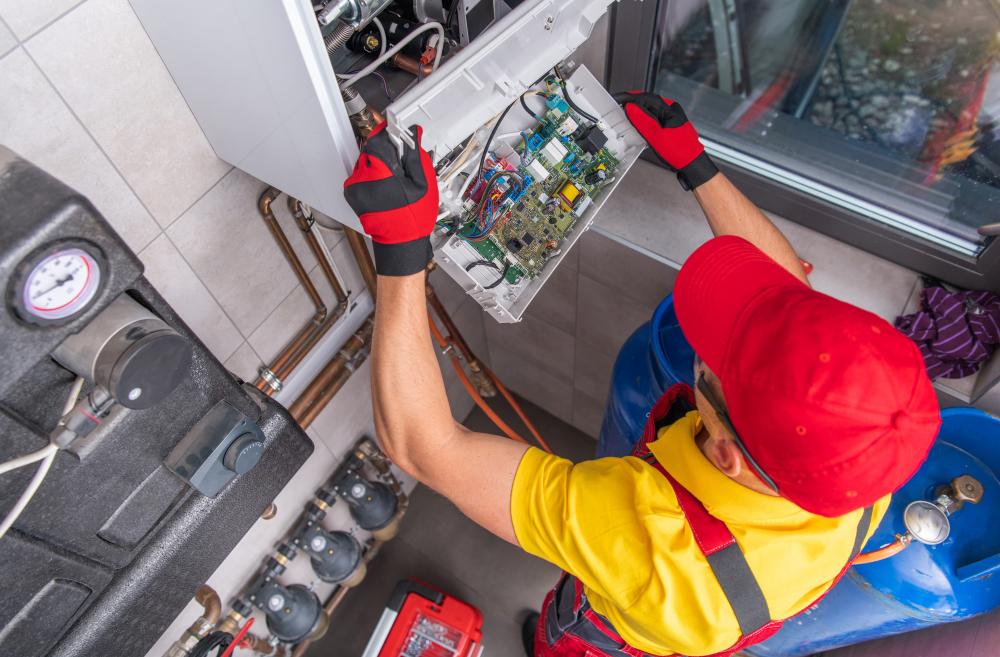
Understanding Boiler Replacement
At B.I.M.S., Inc., we’ve dedicated over four and a half decades to mastering the art of heating, cooling, service, and refrigeration for commercial and industrial settings, particularly specializing in boilers and chillers. From our vast experience, we understand that the decision to replace a boiler is significant. It’s not just about installing a new piece of equipment–it’s about ensuring the continued efficiency, safety, and reliability of your heating systems.
Boiler replacement becomes imperative when you’re faced with frequent breakdowns, inefficiencies, and safety concerns. Modern boilers offer superior energy efficiency, which can significantly reduce operating costs over time. As your guide in this journey, we aim to shed light on the essential facets of replacing a boiler, ensuring you make an informed decision.
Why Replace Your Boiler?
Signs It’s Time
Identifying when your boiler requires replacement comes down to a few critical signs. Aging beyond 15 to 20 years, uneven heating, rising energy bills, and frequent repairs are clear indicators that it’s time for an upgrade. In our practice, we’ve observed that newer, high-efficiency boilers not only address these issues but also contribute to a more sustainable operation.
Benefits of a New Boiler
Opting for boiler replacement is not merely a cost–it’s an investment into greater energy efficiency, enhanced safety, and reliable heating. The right boiler can significantly reduce carbon footprint and fuel consumption, aligning with modern sustainability goals. Also, with technological advancements, new boilers deliver superior performance with lower maintenance requirements.
Choosing the Right Boiler
Boiler Types
- Conventional Boilers: Best for large homes, requiring space for two tanks but offering substantial water storage capacity.
- Combination Boilers: Ideal for smaller premises, combi boilers provide heating and hot water from a single unit, saving space and potentially reducing energy costs.
- System Boilers: A middle-ground option, storing hot water in just one tank and fitting various home sizes.
- Condensing Boilers: Regardless of the boiler type, opting for a condensing model means higher efficiency and lower fuel bills.
Fuel Types
The choice of fuel – be it gas, electricity, oil, or wood – plays a crucial role in determining boiler efficiency, operating costs, and environmental impact. For instance, natural gas is widely available and may be more economical and cleaner than oil or wood. However, electric boilers, while sometimes more expensive to run, can offer nearly 100% efficiency and a smaller carbon footprint.
The Replacement Process
Our approach to boiler replacement is comprehensive, beginning with a thorough assessment of your current system’s condition and requirements. We consider your building’s size, existing infrastructure, and your specific needs to recommend the most suitable boiler options.
Hiring seasoned professionals is crucial, as boiler installation involves complex considerations of gas, electrical, and water systems. Our team of licensed technicians ensures that every installation complies with local codes and standards, guaranteeing safety and efficiency.
Moreover, we believe in transparency throughout the process. From the initial consultation to the final installation, we keep you informed, ensuring the chosen solution aligns with your expectations and budget.
Cost Considerations
Boiler replacement is a significant investment, and understanding the associated costs upfront can help manage expectations and budgeting. The price of a new boiler varies widely depending on the type, size, and fuel source. Additional factors like installation complexity, brand, and any necessary infrastructure changes can also influence the final cost.
Despite the upfront expense, a new, efficient boiler can lead to substantial savings on energy bills in the long run. It is essential to consider both the immediate and long-term financial implications of your boiler replacement decision.
Maintaining Your New Boiler
Once your new boiler is up and running, regular maintenance is key to ensuring its longevity and efficiency. We recommend scheduling annual inspections and servicing to keep your boiler in top condition, identify any issues before they escalate, and ensure it operates safely.
Proactive maintenance not only extends the life of your boiler but also maintains its efficiency, keeping fuel consumption and costs in check. Our team offers comprehensive maintenance services, equipped to address any potential issues promptly.
Choosing B.I.M.S., Inc.
Choosing B.I.M.S., Inc. for your boiler replacement needs means partnering with a team that values integrity, quality, and customer satisfaction above all. Our deep industry experience, coupled with a commitment to excellence, ensures that your boiler replacement process is smooth, efficient, and tailored to meet your specific needs.
Whether you’re in the initial stages of considering boiler replacement or ready to take the next step, we’re here to provide expert advice, quality equipment, and professional installation. Contact us today to learn more about how we can help you achieve your heating objectives with a new, efficient boiler.

How much does a replacement boiler cost?
At B.I.M.S., Inc., we’ve seen boiler replacement costs range significantly based on several factors, including the type of boiler, its size, and the complexity of the installation. Generally, you could be looking at anywhere from $3,500 to $8,000 for a standard residential boiler replacement. However, for commercial applications, due to the larger size and higher capacities needed, the price can escalate quite a bit more. It’s not just about the sticker price of the boiler; it’s also about ensuring that your new boiler is properly sized for your space and installed correctly to operate at its highest efficiency. Transparency is a key part of how we do business, so we’ll provide you with a detailed quote that breaks down all the costs involved. Remember, a more efficient boiler can save you money on energy bills in the long run, making it a worthwhile investment. Have you considered how the efficiency of a new boiler might offset its upfront cost over time?
How much is a boiler for a 2000 sq ft house?
The cost of a boiler for a 2000 sq ft house can vary depending on the heating needs of the house and the type of boiler you choose. For a house of this size, you might be looking at a mid-range boiler that could cost between $3,500 and $5,500. This is a ballpark figure, as the specifics of your home’s layout, insulation, and local climate can all influence the exact requirements. At B.I.M.S., Inc., we conduct a detailed assessment of your home’s heating needs to recommend the most cost-effective and efficient boiler options. Opting for a high-efficiency condensing boiler might have a higher initial cost but can provide significant savings in the long term through lower energy consumption. How important is energy efficiency to you when considering a new boiler?
Is it worth replacing my boiler?
Replacing an outdated or inefficient boiler can often be a wise decision, especially if your current system is over 15 years old, requires frequent repairs, or isn’t heating your space evenly anymore. New boilers are significantly more efficient, meaning they use less fuel to produce the same amount of heat. This efficiency translates into lower energy bills and a reduced carbon footprint. At B.I.M.S., Inc., we’ve helped numerous clients make informed decisions about boiler replacement, leading to improved comfort and savings. Additionally, modern boilers come with advanced features that offer greater control over your heating systems, aligning with contemporary sustainability goals. When contemplating whether it’s worth replacing your boiler, consider not just the immediate costs but the long-term benefits as well. What are your main goals in replacing your boiler?
Should I replace 30 year old boiler?
Absolutely, replacing a 30-year-old boiler is generally advisable. Technologies in heating systems have advanced significantly over the past few decades. A boiler that old is likely operating far below today’s efficiency standards, leading to higher fuel costs and a larger environmental impact. Moreover, parts for older boilers can become difficult to find, making repairs more costly and inconvenient. At B.I.M.S., Inc., we’ve seen firsthand how upgrading to a newer, more efficient model can enhance heating performance, reduce operational costs, and provide a safer, more reliable heating solution. Upgrading your boiler can also increase the value of your property and contribute to a more sustainable future. Have you experienced any issues with your current boiler that have prompted you to consider replacing it?
How can I maintain my new boiler to ensure its longevity and efficiency?
To ensure the longevity and efficiency of your new boiler, regular maintenance is critical. At B.I.M.S., Inc., we recommend scheduling annual inspections and servicing to keep your system running smoothly. These checks can help identify and resolve any potential issues before they escalate, ensuring your boiler operates safely and at peak efficiency. Moreover, routine maintenance can extend the life of your boiler, ensuring you get the most out of your investment. Regularly checking and cleaning your boiler’s components, like the heat exchanger, and keeping an eye on the water levels and pressure, can also help maintain its performance. Remember, an efficiently running boiler is less likely to break down and can save you money on your energy bills. How frequently do you currently conduct maintenance on your heating system?
Resources
- Installing and Maintaining Home Heating Systems – U.S. Department of Energy: Provides information on the installation and maintenance of home heating systems, including boilers.
- Boiler Compliance at Area Source Facilities – Environmental Protection Agency: Offers frequently asked questions and answers regarding boiler compliance at area source facilities.
- Heating Systems for Energy-Efficient Buildings – National Renewable Energy Laboratory: A comprehensive guide on heating systems for energy-efficient buildings, including information on boilers.
- Home Heating Systems – U.S. Department of Energy: Information on home heating systems, their efficiency, and tips for reducing heating costs.



